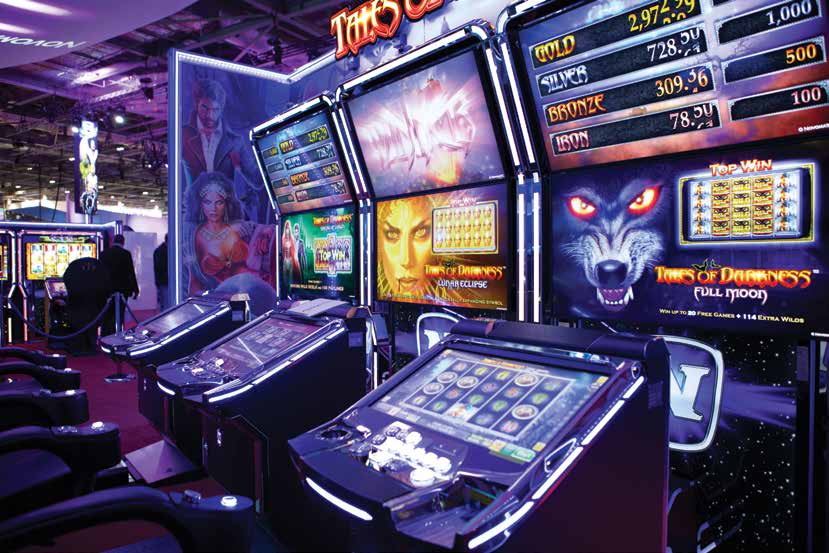IAG sat down with Ian Hughes, CEO and Managing Director of Gaming Laboratories International, to discuss the vitally important work the leading test laboratory carries out for the global gaming industry. By Ben Blaschke
Ben Blaschke: Thanks for speaking with us Ian. Can you start by telling us a bit about the history of GLI?
Ian Hughes: Sure. We’ve been in business for over 25 years now. Originally the company was started in New Jersey by James Maida and Paul Magno. There were at the time only a few jurisdictions in the world that offered gaming and in the US that was basically Atlantic City in New Jersey and Nevada. Then when tribal gaming started to get up and the industry in Australia did the same, the decision had to be made whether gaming should go through a state laboratory, so either government-established laboratories or a private laboratory. At the end of the day, due to the scale and ability to hire the right people, private laboratories clearly had an important place and that’s where GLI came into the fray.
BB: How many state-run laboratories are around today?
IH: There are only a few state labs now in the US. Obviously the New Jersey Department of Gaming has a lab, Nevada has one but it no longer does primary testing. It focuses on policy and technology, so even those governments that have state labs usually only do a certain amount. In New South Wales, the administration board used to have its own lab and I actually set up that lab but they’ve pulled out of testing too. Queensland still has its own state lab. It’s the only lab that is state run in Australia and New Zealand. Again, Queensland also focusses on policy and new technology rather than the enormous nature of testing compliance of machines.
BB: Can you run through the scope of GLI’s work?
IH: Yes, we have several functions and one of our primary functions is as a test laboratory so it’s very much about beta requirements. These could be GLI requirements, they could be state requirements, they could be national standards – whatever the technical standard is, our engineers go through and test for compliance against those requirements. If there are deficiencies we notify the manufacturer and the manufacturer fixes it. From there we continue with the evaluation and that goes backwards and forwards until the product is compliant at which point we issue a certificate of approval. That’s One of GLI’s test labs one side of it.
The other notable thing we do is work closely and early with jurisdictions and governments to work out what technical standards they should implement from a policy perspective. From those discussions we will write technical standards to mitigate and address risk associated with gaming in regards to protection of the player, responsible gaming, protecting tax revenue, security of the machines and so on. All of those risks, the technical standards are designed to mitigate that.
BB: What challenges does having to test against the varying standards set by so many different jurisdictions pose?
IH: It is difficult because it requires a lot of effort, so we basically have a huge database that we enter all requirements into. We have to generate test cases to test against those requirements and the more requirements there are, the more test cases we have. We have a complete Compliance and Quality Assurance Department at GLI and part of their role is to ensure that as these requirements come out, we develop the test cases to test against them. Although our engineers do the actual testing, they run a supplied test to make sure a product is compliant. And every time there is a new rule, there is always a little bit of uncertainty about the interpretation of that rule and how manufacturers observe that rule, so it generally requires some communication back with the regulator as to what they actually mean by that rule. Over time it becomes more tested, but yes it does create challenges.

BB: How involved is GLI in the setting of policy by regulators?
IH: We actually have a whole consulting arm because there are people on our team who are ex-regulators, so they’ve been through that process of public policy. They are able to sit down with policy makers, even though we don’t actually set policy – that’s up to the state or jurisdiction. But if we understand their policies we can talk to them about protective measures that have worked in the past.
What some jurisdictions used to do was look at a nearby jurisdiction and then model their policy on it. That doesn’t always work because of objectives. For example, Japan’s objectives are going to be very different from anywhere else. Japan wants to develop gaming to increase inbound tourism and what that looks like as an integrated resort will be very different from a jurisdiction that already has gaming. We are able to work with those jurisdictions from the very early stages so the Caribbean islands and Latin America, we’ve helped those jurisdictions develop their rules, regulation and controls.
BB: Japan is obviously very topical right now with legislation having finally passed late last year paving the way for a casino industry. Have you been talking to stakeholders there?
IH: Yes, we’ve been working with Japan for many, many years. A lot of jurisdictions set up working parties to conduct research ready for when government does implement policy, so there are already multiple plans going on at a working level. Delegations have been travelling the world, looking at different jurisdictions and markets. We’ve been part of that research and education for many years.
BB: What other areas of gaming does GLI cover?
IH: There are a lot of areas we cover and anti-money laundering is certainly one of them because financial crimes are definitely a concern for a cash-rich industry such as gaming. Jurisdictions at a financial regulatory level want to make sure that gaming regulators put in proper procedures about that. Different countries have different ways of doing it. Australia has specific requirements for gaming through AUSTRAC (Australia’s financial intelligence agency) so they’re very much building systems because there is a lot of captive information about players, payments, transactions and so forth. We’ve been evaluating those at a conceptual level as well as consulting on policy, training, AML, KYC and all those things around anti-money laundering. We’ve found that we’ve been doing, in the gaming space, anything that is associated with risk, so other areas we’re focusing a lot on are those to do with security. As we move to digital currency and different payment technologies, it’s more about PCI compliance so we have found ourselves going into that space and becoming a PCI certified laboratory as well.
BB: When it comes to developing new slot machines and other machine-based gaming products, at what stage of the process does GLI come in?
IH: We work with manufacturers right from the main logic board, the hardware. There is a lot of security that has to go into everything from the reboot process – how the game initially starts up – so if they miss out on some fundamentals in their hardware it can be very costly for them later on. So we work through that.
BB: Can you run us through the various tests that must be conducted on a slot machine before it is certified?
IH: It’s a big proposition. From the hardware point of view you’ve got the gaming machine cabinet and all the peripherals, but the main thing is to make sure that the logic unit is secure. It has to be immune to electrostatic discharges and those kind of things. But most of the work goes into the software side of things. I hate to say it but at the end of the day slots are glorified PCs. Back in the day a lot of the manufacturers used to develop their own operating systems, now they’re using a Windows based operating system so a lot of the manufacturers don’t really have to write the operating system like they used to – but they do have to write all functionality around a few things.
One of them is a random number generator, so we first focus on that – the entropy, how it comes up with numbers and to make sure that it truly is random, because at the end of the day if it’s not random, the game is over. The other main part of it is communications. It has to communicate with an accounting system, so we spend hundreds of hours on our evaluation making sure the communication between the machine and the system is compliant through whatever the protocol is. Then you’ve got all the accounting functions to make sure all the meters are run correctly, so that’s what we call the base. The game sits on top of that.

Once the base is sorted out you put the game content on it and we spend a lot of time looking at help screens and pay tables to make sure the game is adequately paying out to the player. It’s interesting, this is where we tend to find 50 to 60% of the problems we encounter – help screens and pay tables. Often it is simple errors in wording where we don’t think the explanation for the player is adequate for them to understand. Games are getting more and more complex and the requirement is that players are fully informed about the game options. That requires more and more work to go through, particularly with the advent now of skill-based games and some of the alternatives we’re seeing with that. A lot of skill-based games let players practice the game before they play the game and the thought is that, because there is no actual money being wagered on the practice game, the rules are learnt through experience. So that can cause some problems.
Then the pays and awards are very critical to make sure that when a certain spin comes up, it pays the correct pay. We run through all the winning pay combinations – three Aces, four Aces, five Aces – and make sure the game mechanics pays out the correct amount.
BB: Aristocrat was recently taken to court in Melbourne by a person claiming that one of their games is deceptive. Is this one of the things GLI tests for?
IH: There is obviously a lot of controversy about what a win is. If the win is lower than the actual stake, is that really a win? So we look at wins on a pay line and, if the player is playing multiple pay lines, what information is being displayed to the player to inform them of these factors and so forth. The goal is to ensure that the player is given all the information they need to make a fully informed decision about the true odds of winning one of the top award prizes. Making sure the player is able to make a well-informed decision is an area we spend a lot of time on.
BB: What’s the process if a machine fails one of your tests?
IH: If it happens during our evaluation cycle, we have a software tracking database that we use that the manufacturers can see in real time as well. We’re very open. As soon as we enter it into the database they can log in, they can see the information, they can recreate the issue and they can fix it. They will make a software patch and we will then test it again to make sure it works correctly. We’ll continually go through that process until we have completed all of our testing and it passes.
If there is a report of an incident in the field where a machine might not have paid correctly, then we will do a forensic investigation on it. We will send our engineers to get as much information about it as possible, we’ll try to recreate the issue and we’ll determine whether it was a software defect or error or whether someone is trying to perform some sort of manipulation.
BB: Do you conduct random field tests?
IH: We do – always directed by the regulator. We do a field service where we do a site inspection. This is when we go onto the casino floor and verify the software that is running on the machines to ensure it is the certified version of the software and hasn’t been replaced with alternative software. We have a number of verification tools we use to do that and we use Kobiconn signatures, Kobiconn devices to verify that.

Skill based games such as Scientific Games’ Space Invaders present their own challenges to engineers
BB: You mentioned skill-based games earlier. What challenges do they pose for GLI’s engineers that regular slot machines don’t?
IH: The biggest challenge with those is to work out the mathematical model of them. Different jurisdictions have different requirements so Atlantic City, New Jersey has a requirement that the game is able to return nothing to the player. Zero percent (in the skill-based feature). So if you’re a terrible player, theoretically the machine can return nothing to you.
Other jurisdictions have a safety limit so no matter how bad you are, they have to return something to the player. The mechanics of how the game designers work that into the game varies so we have to look at the math models behind the logic, how good you are, best player strategy, average player strategy and come up with what we believe the return-to-player range will be. Then we have to figure out a way to evaluate that, so depending on the game – some require skill dexterity and we try to automate that as much as possible. We can create robots that basically have perfect skill so we use those sorts of things. Rather than just trying to get really good at it, we try to be a little bit more precise.
BB: How does that play out in terms of the maths?
IH: A lot of skill-based games use physics engines rather than a random number generator. A traditional slot machine will use a random number generator, an algorithm, to come up with a number. Skill-based gaming uses much more complex physics engines based on real world modelling using finite element analysis – like you would if you were designing a car or modelling a building. You use the physics engine to determine if a bouncing ball bounces like a bouncing ball. You use control elements like gravity, viscosity and friction – all of these parameters come into play to determine how it actually works. So it’s a much more complex engine than a standard gaming machine.
BB: Obviously iGaming is becoming increasingly popular. How do these games generally compare to traditional slot machines?
IH: iGaming is different, it’s a little bit simpler. The games we see on the iGaming platform tend to be much flatter than those we see on a gaming machine. I think the reason is that the platform they are going to be displayed on to the player is going to be a tablet device or a small device, so the game design itself has to be very different than an immersive style large screen cabinet with surround sound. Also, on a mobile device the player just wants to play the game for a short time so the game has to be much quicker. From an evaluation point of view, we see a lot of reskinning of games and similar maths models.
The other thing is that we see few differences in requirements via jurisdictions in iGaming as opposed to land-based. iGaming we can narrow down to 12 key markets whereas land based gaming has more than 400 jurisdictions that we test for and they are all very different. The biggest difference with iGaming is the language – we have to make sure it’s shown in the right currency. But the fundamentals are similar.
BB: Finally Ian, why is the work you do so important to the gaming industry?
IH: I think number one is public confidence. If the public isn’t confident that they are playing a fair product the whole industry is gone. We saw that with the lotteries in the late 1800s in the US. If the public is offered a device they don’t think gives them a fair chance, the whole industry is gone.




























